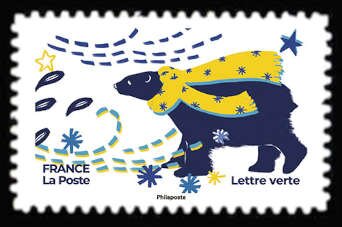Stamp: Bear (France 2021)
Bear (France 2021)
02 November (France ) within release Christmas 2021 : Let's Celebrate goes into circulation Stamp Bear face value Lettre No Face Value
| Stamp Bear in catalogues | |
|---|---|
| Colnect codes: | Col: FR 2021-62k |
Stamp is horizontal format.
stamp from booklet. Face value € 1.08 on day of issueAlso in the issue Christmas 2021 : Let's Celebrate:
- Stamp - Animals in Forest face value Lettre;
- Stamp - Animals in Forest at Night face value Lettre;
- Stamp - Bear face value Lettre;
- Booklet - Christmas 2021 : Let's Celebrate face value 12*Lettre;
- Stamp - Deer in Winter Forest face value Lettre;
- Stamp - Forest and Leaves face value Lettre;
- Stamp - Fox in Winter Forest face value Lettre;
- Stamp - Gifts face value Lettre;
- Stamp - Penguin in Winter Forest face value Lettre;
- Stamp - Reindeer in Winter Forest face value Lettre;
- Stamp - Snowflakes face value Lettre;
- Stamp - Squirrels in Winter Forest face value Lettre;
- Stamp - Trees and Flower face value Lettre;
Stamp Bear it reflects the thematic directions:
Animals are multicellular, eukaryotic organisms of the kingdom Animalia (also called Metazoa). All animals are motile, meaning they can move spontaneously and independently, at some point in their lives. Their body plan eventually becomes fixed as they develop, although some undergo a process of metamorphosis later on in their lives. All animals are heterotrophs: they must ingest other organisms or their products for sustenance.
Bears are carnivoran mammals of the family Ursidae (/ˈɜːrsɪdiː, -daɪ/). They are classified as caniforms, or doglike carnivorans. Although only eight species of bears are extant, they are widespread, appearing in a wide variety of habitats throughout most of the Northern Hemisphere and partially in the Southern Hemisphere. Bears are found on the continents of North America, South America, and Eurasia. Common characteristics of modern bears include large bodies with stocky legs, long snouts, small rounded ears, shaggy hair, plantigrade paws with five nonretractile claws, and short tails.
Christmas or Christmas Day (Old English: Crīstesmæsse, meaning "Christ's Mass") is an annual festival commemorating the birth of Jesus Christ, observed most commonly on December 25 as a religious and cultural celebration among billions of people around the world. A feast central to the Christian liturgical year, it is prepared for by the season of Advent or the Nativity Fast and initiates the season of Christmastide, which historically in the West lasts twelve days and culminates on Twelfth Night; in some traditions, Christmastide includes an Octave. The traditional Christmas narrative, the Nativity of Jesus, delineated in the New Testament says that Jesus was born in Bethlehem, in accordance with messianic prophecies; when Joseph and Mary arrived in the city, the inn had no room and so they were offered a stable where the Christ Child was soon born, with angels proclaiming this news to shepherds who then disseminated the message furthermore. Christmas Day is a public holiday in many of the world's nations, is celebrated religiously by the vast majority of Christians, as well as culturally by a number of non-Christian people, and is an integral part of the holiday season, while some Christian groups reject the celebration. In several countries, celebrating Christmas Eve on December 24 has the main focus rather than December 25, with gift-giving and sharing a traditional meal with the family.



